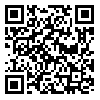Volume 11, Issue 2 (11-2014)
J Res Dev Nurs Midw 2014, 11(2): 45-52 |
Back to browse issues page
1- , mahdisadeghi@shmu.ac.ir
Abstract: (25338 Views)
Background and Objective: Due to the widespread impact of diabetes on various aspects of life and the important role of self-efficacy in self-care behaviors of diabetic patients, we aimed at determining the relationship between quality of life dimensions and self-efficacy, and some related factors in patients with type 2 diabetes.
Material and Methods: This cross-sectional study was conducted on 156 patients, selected via convenience sampling, with type II diabetes in Shroud (2013). The instruments were a demographic checklist, diabetic quality of life questionnaire and self-efficacy questionnaire. Data analysis was performed by descriptive statistics and Pearson correlation coefficient (0.05).
Results: in accordance with the results, the quality of life was moderate and the lowest score was related to physical dimension. There was a significant relationship between self-efficacy and all aspects of quality of life in that the patients with higher self-efficacy had the more quality of life. Moreover, there was a significant linear relationship between quality of life and variables such as age, diabetes duration and body mass index.
Conclusion: given that the increased self-efficacy is associated with quality of life improvement , it seems likely that we can maximize the quality of life in these patients by applying self-efficacy enhancement programs.
Type of Study: Original Article |
| Rights and permissions | |
 |
This work is licensed under a Creative Commons Attribution-NonCommercial 4.0 International License. |


